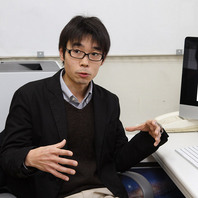![]()
![]()
Research Support Office Research Advancement Division. Tokyo University of Agriculture and Technology
| TEL | +81-42-367-5944 |
|---|---|
| FAX | +81-42-367-5946 |
This program is supported by MEXT’s scientific technology human resource development fee grant, "Program to Disseminate Tenure Tracking System".
Home > Tenured Faculties > Nakaba Satoshi

Nakaba Satoshi

| Affiliation | Institute of Agriculture |
|---|---|
| Division | Division of Natural Resources and Eco-materials |
| Research field | Natural Resources and Eco-materials |
| Keyword(S) | Tree Physiology, Cell Biology, Wood Anatomy |
| Url | http://web.tuat.ac.jp/~tokusei/index.html |
| Research experience | ・2007-2009 JSPS Research fellow (DC2) |
|---|---|
| Educational background | ・2004 Graduated Faculty of Agriculture, Hokkaido University |
| Awards | * The latest information is shown at the member's website. |
| Selected papers and publications | * The latest information is shown at the member's website. |
Now, we have global issues such as global warming, resource and energy problems. As solution of these issues, interest in woody biomass as a renewable resource is increasing. Woody biomass is produced by photosynthesis of trees. The characteristics of woody biomass are controlled by biological process. Genetic and climatic factors affect on quantity (tree growth) and quality (structure and characteristics) of woody biomass. This fact indicates that we can control quantity and quality of woody biomass. Therefore, understanding of the mechanism of formation of woody biomass is important for effective utilization of woody biomass.
So, what kind of research is needed for understanding of the mechanism of formation of woody biomass? The characteristic of woody biomass is determined by that of woody cell which is component of woody biomass. Therefore, we can translate the mechanism of formation of woody biomass into the mechanism of cell division and differentiation of woody cells. Now, I have focused on "the mechanism of cell differentiation in trees". Aim of my research is to clarify how to produce the structure and the characteristics of woody biomass.
I think the great feature of tenure track system in our university is ensuring the tenure post, which can be obtain after tenure track, at the time of employment. This feature means that effort will be rewarded. This feature make it possible that we can challenge some basic research which we could not expect the result soon. I want to exploit this opportunities.
Research on woody biomass is important for resource and environment in our future. In such situation, I would like to challenge to develop the potential for woody biomass as renewable resources. Moreover, I would like to efforts to develop human resources who have an ability to solve the problem from the viewpoint of natural science.